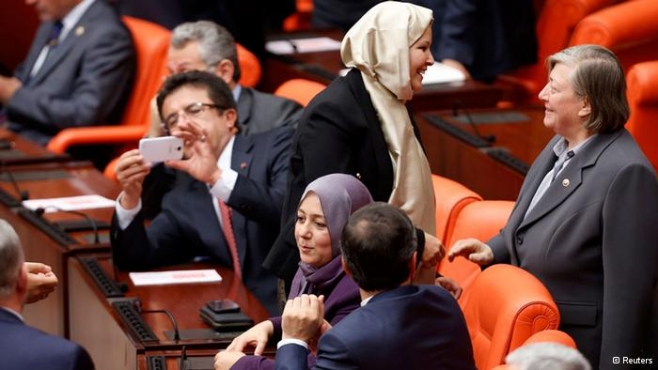Four lawmakers from Turkey’s Islamist-rooted governing party have appeared the country’s parliament wearing headscarves, This came just weeks after a ban on wearing the headscarf in government buildings was lifted.

Other members of Prime Minister Recep Tayyip Erdogan’s Justice and Development Party (AKP) greeted the four female lawmakers with hugs and kisses when they entered the chamber wearing their headscarves on Thursday.
“We are going to witness the start of an important era and we will play the leading role, we will be the standard-bearers, this is very important,” one of the four, Nurcan Dalbudak, told the Reuters news agency.
The main secular opposition Republican People’s Party (CHP), which had previously said it would contest any parliamentarians seeking to wear headscarves in the chamber, did not officially respond to the move on the day. A few of its members did jeer as the four women entered the assembly, while another wore a T-shirt depicting the face of the Turkish Republic’s secular founder, Mustafa Kemal Ataturk, who also founded the CHP.
Reform package
The move came just weeks after Prime Minister Erdogan announced that his government would lift Turkey’s decades old ban on wearing headscarves in state institutions. This was just one feature in a package of reforms Erdogan said were designed to make Turkey more democratic.
The AKP argued that lifting the headscarf ban was a matter of civil rights, at it had prevented religious Muslim women from openly expressing their faith.
Critics argue this and other measures, such as imposing new restrictions on the sale of alcohol demonstrate that Erdogan and his party are seeking to weaken the secular order modern Turkey was built upon.
Thursday’s events were in stark contrast to the last time a woman entered parliament wearing a headscarf. When newly elected lawmaker Merve Kavakci attempted to take the oath while wearing a headscarf in 1999, then-Prime Minister Bulent Ecevit ordered her out of the building. Many other parliamentarians then shouted at her to “get out.”
Source: AP, Reuters








